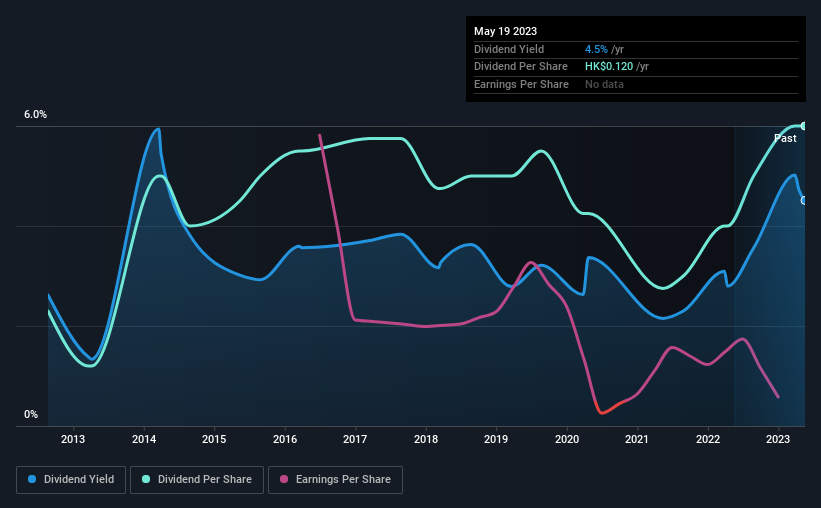Matrix Holdings' (HKG:1005) Upcoming Dividend Will Be Larger Than Last Year's
Matrix Holdings Limited (HKG:1005) will increase its dividend from last year's comparable payment on the 6th of June to HK$0.08. This makes the dividend yield about the same as the industry average at 4.5%.
Check out our latest analysis for Matrix Holdings
Matrix Holdings Doesn't Earn Enough To Cover Its Payments
We like a dividend to be consistent over the long term, so checking whether it is sustainable is important. Before making this announcement, Matrix Holdings' dividend was higher than its profits, but the free cash flows quite comfortably covered it. Generally, we think cash is more important than accounting measures of profit, so with the cash flows easily covering the dividend, we don't think there is much reason to worry.
EPS is set to fall by 44.0% over the next 12 months if recent trends continue. Assuming the dividend continues along recent trends, we believe the payout ratio could reach 2,448%, which could put the dividend under pressure if earnings don't start to improve.

Dividend Volatility
Although the company has a long dividend history, it has been cut at least once in the last 10 years. Since 2013, the annual payment back then was HK$0.046, compared to the most recent full-year payment of HK$0.12. This implies that the company grew its distributions at a yearly rate of about 10% over that duration. Dividends have grown rapidly over this time, but with cuts in the past we are not certain that this stock will be a reliable source of income in the future.
Dividend Growth Potential Is Shaky
With a relatively unstable dividend, it's even more important to evaluate if earnings per share is growing, which could point to a growing dividend in the future. Earnings per share has been sinking by 44% over the last five years. This steep decline can indicate that the business is going through a tough time, which could constrain its ability to pay a larger dividend each year in the future.
The Dividend Could Prove To Be Unreliable
Overall, we always like to see the dividend being raised, but we don't think Matrix Holdings will make a great income stock. The company is generating plenty of cash, which could maintain the dividend for a while, but the track record hasn't been great. We would be a touch cautious of relying on this stock primarily for the dividend income.
Companies possessing a stable dividend policy will likely enjoy greater investor interest than those suffering from a more inconsistent approach. At the same time, there are other factors our readers should be conscious of before pouring capital into a stock. Just as an example, we've come across 4 warning signs for Matrix Holdings you should be aware of, and 1 of them doesn't sit too well with us. Looking for more high-yielding dividend ideas? Try our collection of strong dividend payers.
New: Manage All Your Stock Portfolios in One Place
We've created the ultimate portfolio companion for stock investors, and it's free.
• Connect an unlimited number of Portfolios and see your total in one currency
• Be alerted to new Warning Signs or Risks via email or mobile
• Track the Fair Value of your stocks
Have feedback on this article? Concerned about the content? Get in touch with us directly. Alternatively, email editorial-team (at) simplywallst.com.
This article by Simply Wall St is general in nature. We provide commentary based on historical data and analyst forecasts only using an unbiased methodology and our articles are not intended to be financial advice. It does not constitute a recommendation to buy or sell any stock, and does not take account of your objectives, or your financial situation. We aim to bring you long-term focused analysis driven by fundamental data. Note that our analysis may not factor in the latest price-sensitive company announcements or qualitative material. Simply Wall St has no position in any stocks mentioned.
About SEHK:1005
Matrix Holdings
An investment holding company, manufactures and trades in toys and lighting products and property development in Hong Kong.
Slight risk with mediocre balance sheet.
Market Insights
Community Narratives



